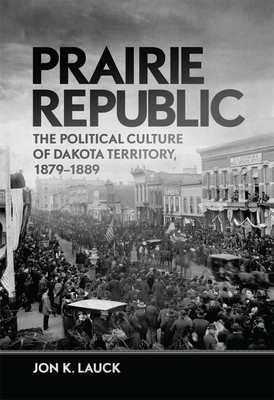
- We will send in 10–14 business days.
- Author: Jon K Lauck
- Publisher: University of Oklahoma Press
- ISBN-10: 0806167378
- ISBN-13: 9780806167374
- Format: 14 x 21.6 x 1.7 cm, minkšti viršeliai
- Language: English
- SAVE -10% with code: EXTRA
Reviews
Description
American democratic ideals, civic republicanism, public morality, and Christianity were the dominant forces at work during South Dakota's formative decade.
What?
In our cynical age, such a claim seems either remarkably naïve or hopelessly outdated. Territorial politics in the late-nineteenth-century West is typically viewed as a closed-door game of unprincipled opportunism or is caricatured, as in the classic film The Man Who Shot Liberty Valance, as a drunken exercise in bombast and rascality.
Now Jon K. Lauck examines anew the values we like to think were at work during the founding of our western states. Taking Dakota Territory as a laboratory for examining a formative stage of western politics, Lauck finds that settlers from New England and the Midwest brought democratic practices and republican values to the northern plains and invoked them as guiding principles in the drive for South Dakota statehood.
Prairie Republic corrects an overemphasis on class conflict and economic determinism, factors posited decades ago by such historians as Howard R. Lamar. Instead, Lauck finds South Dakota's political founders to be agents of Protestant Christianity and of civic republicanism--an age-old ideology that entrusted the polity to independent, landowning citizens who placed the common interest above private interest. Focusing on the political culture widely shared among settlers attracted to the Great Dakota Boom of the 1880s, Lauck shows how they embraced civic virtue, broad political participation, and agrarian ideals. Family was central in their lives, as were common-school education, work, and Christian community.
In rescuing the story of Dakota's settlers from historical obscurity, Prairie Republic dissents from the recent darker portrayal of western history and expands our view and understanding of the American democratic tradition.
EXTRA 10 % discount with code: EXTRA
The promotion ends in 21d.06:06:06
The discount code is valid when purchasing from 10 €. Discounts do not stack.
- Author: Jon K Lauck
- Publisher: University of Oklahoma Press
- ISBN-10: 0806167378
- ISBN-13: 9780806167374
- Format: 14 x 21.6 x 1.7 cm, minkšti viršeliai
- Language: English English
American democratic ideals, civic republicanism, public morality, and Christianity were the dominant forces at work during South Dakota's formative decade.
What?
In our cynical age, such a claim seems either remarkably naïve or hopelessly outdated. Territorial politics in the late-nineteenth-century West is typically viewed as a closed-door game of unprincipled opportunism or is caricatured, as in the classic film The Man Who Shot Liberty Valance, as a drunken exercise in bombast and rascality.
Now Jon K. Lauck examines anew the values we like to think were at work during the founding of our western states. Taking Dakota Territory as a laboratory for examining a formative stage of western politics, Lauck finds that settlers from New England and the Midwest brought democratic practices and republican values to the northern plains and invoked them as guiding principles in the drive for South Dakota statehood.
Prairie Republic corrects an overemphasis on class conflict and economic determinism, factors posited decades ago by such historians as Howard R. Lamar. Instead, Lauck finds South Dakota's political founders to be agents of Protestant Christianity and of civic republicanism--an age-old ideology that entrusted the polity to independent, landowning citizens who placed the common interest above private interest. Focusing on the political culture widely shared among settlers attracted to the Great Dakota Boom of the 1880s, Lauck shows how they embraced civic virtue, broad political participation, and agrarian ideals. Family was central in their lives, as were common-school education, work, and Christian community.
In rescuing the story of Dakota's settlers from historical obscurity, Prairie Republic dissents from the recent darker portrayal of western history and expands our view and understanding of the American democratic tradition.


Reviews